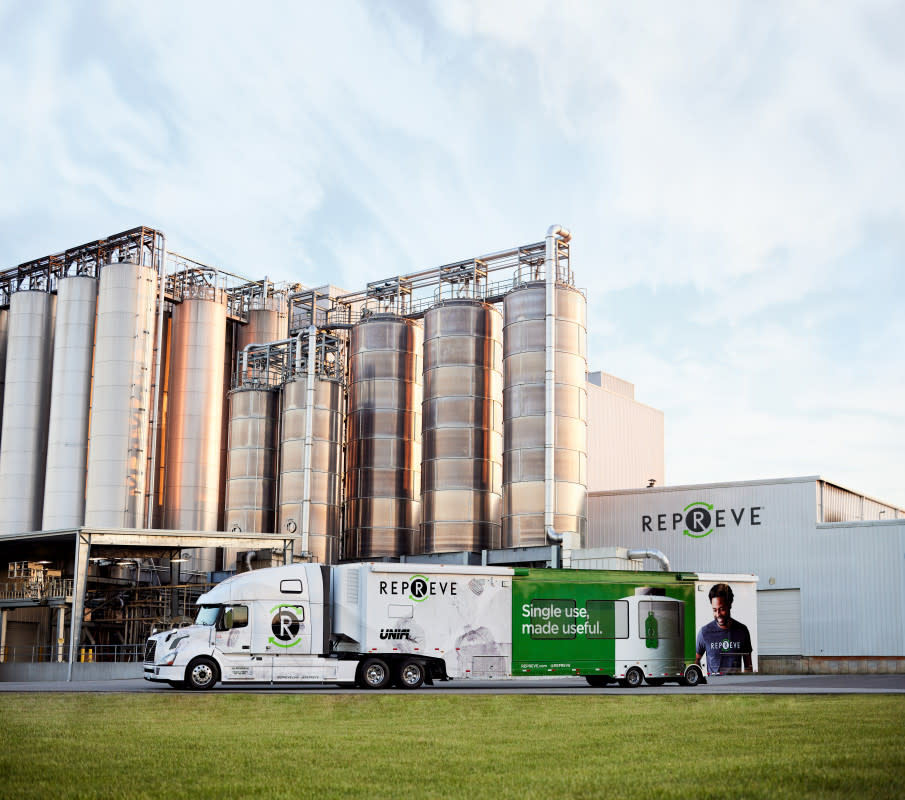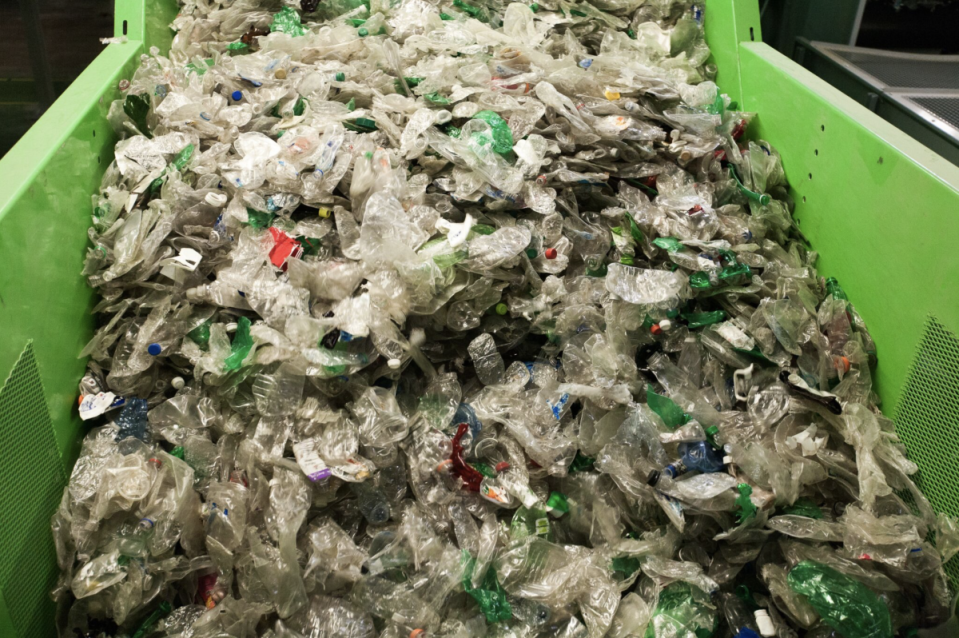Inside the North Carolina Facility Making Clothing Fabric Out of Recycled Plastic Bottles
In fashion, sustainable textiles were once a mere amenity promoted by the few committed brands that prioritized investing in them. Now, they're entering the mainstream. And that's because more and more consumers are all but demanding them.
A recent consumer survey found that today, 88% of Americans are at least somewhat likely to choose recycled clothing over new, while 86% believe clothing made from recycled materials is just as durable as (or even more durable than) clothes made from virgin materials. Even Zara's owner Inditex, the world's largest clothing retailer, is set to buy 2,000 metric tons of recycled fiber made from cotton waste. Could a better-for-the-planet fabric alternative help set the famously destructive fashion industry on a less damaging path? One company — with a lion's share of its operations running out of a small, rural city in northern North Carolina — is betting on it.
Enter Repreve, the world's number-one brand of recycled performance fiber. It's here in the rolling farmlands of Yadkin County that this massive, 1.5-million-square-foot facility takes post-consumer plastic bottles and turns them into a specialized recycled polyester that can do, well, just about everything, like wicking, odor control, water resistance and more. And though Repreve first found success in the outdoor category with labels like Patagonia, its portfolio of partners now dabbles in sectors from surfwear to car interiors.
The company's retail impact extends beyond those brands to which it supplies fabric. Repreve sources bottles in partnership with communities and Material Recovery Facilities (MRFs), and since its launch in 2007, Repreve states that it's prevented roughly 35 billion contaminated bottles from going to the landfill. For Meredith Boyd, senior vice president of technology, innovation and sustainability of Repreve's parent company Unifi Manufacturing, Inc., that griminess is kind of the point.
"What's really remarkable is that we don't start with something that looks clean and pristine," she explains. "We start with stuff that's pretty junky, because here in the U.S., we have a somewhat abysmal recycling rate."
"Abysmal" isn't hyperbole. In 2018, the Environmental Protection Agency (EPA) estimated the nationwide plastic recycling rate to be just 9%, meaning that more than 91% of plastics generated that year were put in a landfill or incinerated for energy. In 2021, though, nonprofits Last Beach Cleanup and Beyond Plastics found the more accurate rate was actually nearly half that, at under 5%. If we apply that percentage to plastic bottles, then, the numbers are staggering: An estimated 29 billion of them are used in the U.S. alone each year, 27.5 billion of which head straight for waste.

Photo: Courtesy of Repreve
Repreve offers a more functional alternative. Its processing center in North Carolina receives more than 130 million pounds of recycled material annually, which it then washes and processes to melt into plastic flakes. The plant runs those sparkly, pristine flakes through an extruder, melting them once again into long fiber filaments, the strands of which are spun into yarn and dyed as needed. And at any point in this process, cleanliness is truly next to godliness.
"There's some contamination that still exists," says Boyd. "We know how to clean that up and have special filtration technology that lets us get rid of particles the naked eye can't see. Because ultimately, the individual, teeny-tiny filaments are even smaller than the diameter of a piece of hair. Any amount of contaminant that enters that is really bad for the process."
Unifi, which makes Repreve, is not new to this genre of product innovation. The international textile manufacturing company has been creating specialty synthetic yarns for over 50 years, originally producing traditional polyester fibers before inventing Repreve fabric in 2007.
Polyester, though, has a complicated standing in the industry. The Wall Street Journal recently referred to the petroleum-derived synthetic as "the refined sugar of our wardrobes," saying it's "cheap, has an iffy reputation and is in almost everything, from stretchy leggings to $4,000 jackets." According to Textile Exchange, a nonprofit committed to fabric sustainability, it has grown to become the most popular material used in the fashion industry, representing 52% of global fiber production in 2020.
For Repreve, therein lies the opportunity. Because as The Wall Street Journal pointed out, polyester — the "most-used" material in clothing — may also be "the ultimate recyclable fiber."
"There have been a lot of misconceptions about recycled polyester, that it was going to be a bad color, that it was going to be weak," says Boyd. "From moment one, we knew our product had to eliminate all of those 'what ifs,' the misconceptions or real constraints that recycled polyester has faced in the past."

Photo: Courtesy of Repreve
Repreve went about doing so with a stable of trademarked inventions. There's its SmartDye technology, which dyes fabrics at lower temperatures and reportedly achieves an energy savings of up to 30%. There's ChillSense, which transfers heat from the body to the fabric more quickly, creating a cool sensation to the touch. And with Repreve's waterless dyeing process called Waterwise, solution dye becomes part of the fiber as it's being extruded, conserving natural resources in the process.
Boyd explains that this suite of technology may not be a fit for each and every one of the brands to which Repreve supplies its fabric — and that's okay. With the U.S.'s lack of functional (not to mention accessible) recycling infrastructure, brands are welcome to partner with the company through whichever means is most practical for them. Because when it comes to circularity, perfect can be the enemy of good.
"I spend a lot of time talking to retailers about opportunities about how to design for recyclability, ensuring that their articles of clothing are going to be compatible to the recycling technologies we have ready to use today," says Boyd. "We come in as an educator first and a resource second."
To track its impact, Repreve relies on an ongoing, quantitative lifecycle analysis that, for heightened efficacy, has been put under a third-party peer review. The company reports that this process has been able to quantify a 20% reduction in energy per pound of product produced.
Which is where the polyester problem, and Repreve's possible solution, factors back in. The apparel industry used an estimated 34 million tons — nearly 75 billion pounds — of polyester in 2021 alone. What if fashion could see a 20% energy drop in all those billions of pounds?
"It's obvious that you're going to use less stuff and create fewer emissions when you recycle, but we find it very useful to be able to quantify it in a very scientific way for our customers," says Unifi's CEO Eddie Ingle. "Our job is to help brands and retailers meet their sustainability targets."
Want the latest fashion industry news first? Sign up for our daily newsletter.

